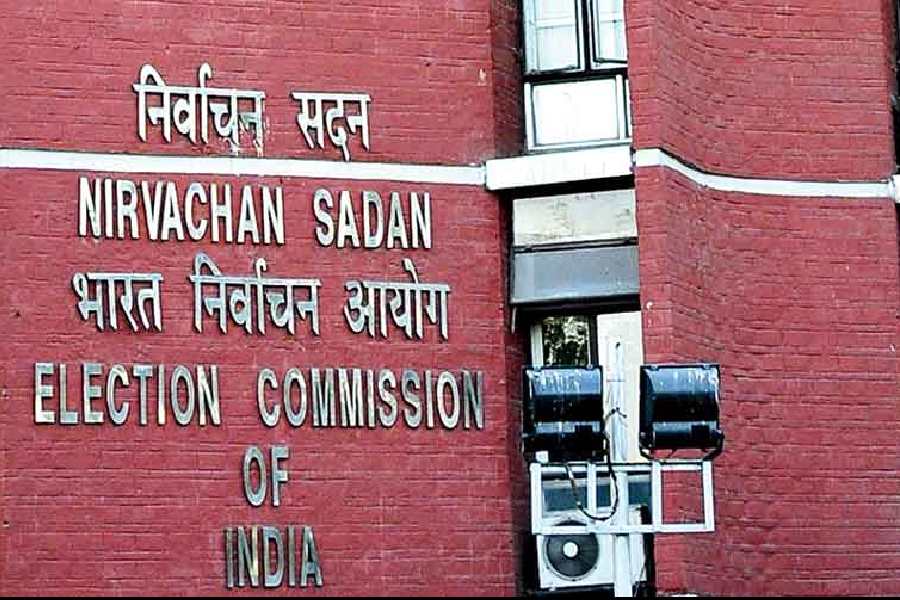A bill tabled by the Narendra Modi government on Thursday in the Rajya Sabha seeks to replace the Chief Justice of India with a Union cabinet minister in a panel that was to be set up on the order of the Supreme Court to select the Chief Election Commissioner (CEC) and election commissioners.
The bill effectively restores the balance in favour of the government of the day — a slant the Supreme Court had sought to remove by a ruling on March 3.
The content of the bill has also triggered allegations that the election commissioners are being downgraded.
The apex court had ordered the creation of a selection committee headed by the Prime Minister, and composed of the leader of the Opposition in the Lok Sabha and the Chief Justice of India for appointing the CEC and the other poll commissioners until the Centre passed a law in this regard.
The Modi government has cited the concluding phrase — until a law is passed — to move the Chief Election Commissioner and other Election Commissioners (Appointment Conditions of Service and Term of Office) Bill, 2023.
The bill says the selection committee, headed by the Prime Minister, will have the leader of the Opposition in the Lok Sabha and a cabinet minister as members.
Opposition leaders and former CECs slammed the bill for reducing the Election Commission to “a puppet".
Until the Supreme Court verdict of March 3, the election commissioners were appointed by the President on the recommendation of the cabinet — specifically the appointments committee of the cabinet (ACC), chaired by the Prime Minister and whose members are made up of the Union home minister and the minister concerned.
For the Election Commission, this is the law minister, who presents a list of names at the ACC meeting. The senior-most election commissioner is made the Chief Election Commissioner, according to convention.
On Thursday, as law minister Arjun Ram Meghwal sought to introduce the bill in the Rajya Sabha, the Opposition benches emptied into the Well in protest.
The lone exception was CPM’s John Brittas as he had submitted a notice under Rule 67 opposing the introduction of the bill. Keen to ensure that his notice is taken up, Brittas remained at his designated place in the House.
Chairman Jagdeep Dhankhar read out his notice and asked whether he was moving. Brittas affirmed his intent to move his motion. The Chair said the motion was not moved and went ahead with the process of bill introduction.
The protests in the Well became louder and marshals were called in to throw a ring around the Chair as the rest of the legislative business for the day was rushed through.
In his notice opposing the introduction of the bill, Brittas said the draft legislation overrode the Supreme Court judgment.
The bill also equates the salary and other benefits of the commissioners with those of the cabinet secretary. This was previously equated with what the judges of the Supreme Court enjoy and was codified in the Election Commission (Conditions of Service of Election Commissioners and Transaction of Business) Act, 1991.
Although the salaries are the same, the stature of a Supreme Court judge is considered greater than a cabinet secretary as the court can summon the highest functionaries of the government. The Election Commission plays a similar role.
A former Chief Election Commissioner explained: “If the stature of an umpire in a cricket match is on a par with the captain of a team, how impartial can he be and what authority will he be able to exert on the players? In no way should any tinkering be done that impinges upon the independent functioning of the EC.”
Another former CEC told The Telegraph: “It appears that the Centre wants no role of the judiciary in what it sees as an executive function. This is the message the bill conveys by downgrading election commissioners from the status of a Supreme Court judge to that of the cabinet secretary. This government wants to dilute the authority of every statutory body. The status of the Union Public Service Commission members and information commissioners was similarly downgraded in recent years.”
He added: “I welcome the selection committee as it at least includes a voice from outside the government. However, the committee can appoint both ECs and CECs, so the senior-most EC may not automatically be made the CEC. This happened in the UPSC in 2014 when Deepak Gupta superseded Alka Sirohi — who was seen as tough — as chairperson. N. Gopalaswami, whom the Congress accused of favouring the BJP in the 2004 Lok Sabha polls, became CEC in line with seniority in 2006 when the UPA had come to power. The question to ask is that henceforth, will any EC who is not friendly to the ruling party be made CEC?”
Former CEC T.S. Krishna Murthy also disapproved of the perceived downgrading of the EC. “The bill confines the selection to secretaries to the Government of India who have election experience, which gives the impression that it would be confined to the IAS and is not open to any other good officer with election experience…. If the government did not want the judiciary to have a role, it could have kept the Speaker in the committee instead of a minister nominated by the PM,” he told this newspaper.
Krishna Murthy, and most recently Sushil Chandra, were from the Indian Revenue Service.
Congress MP Randeep Surjewala tweeted: “Facing imminent defeat in the 5 election-going states as also the 2024 Lok Sabha elections, The Election Commissioners (Appointment, Conditions of Service And Term of Office) Bill, 2023, is a sinister ploy to hijack Democracy, by constituting a puppet ‘Modi Election Commission’.”
CPM general secretary Sitaram Yechury tweeted that the Modi government “seems to ape” the efforts of the extreme Right-wing government in Israel to make the “judiciary subservient”.
“The Constitution of India mandates an impartial Election Commission to conduct ‘free and fair’ elections. This move destroys EC’s impartiality,” he added.











